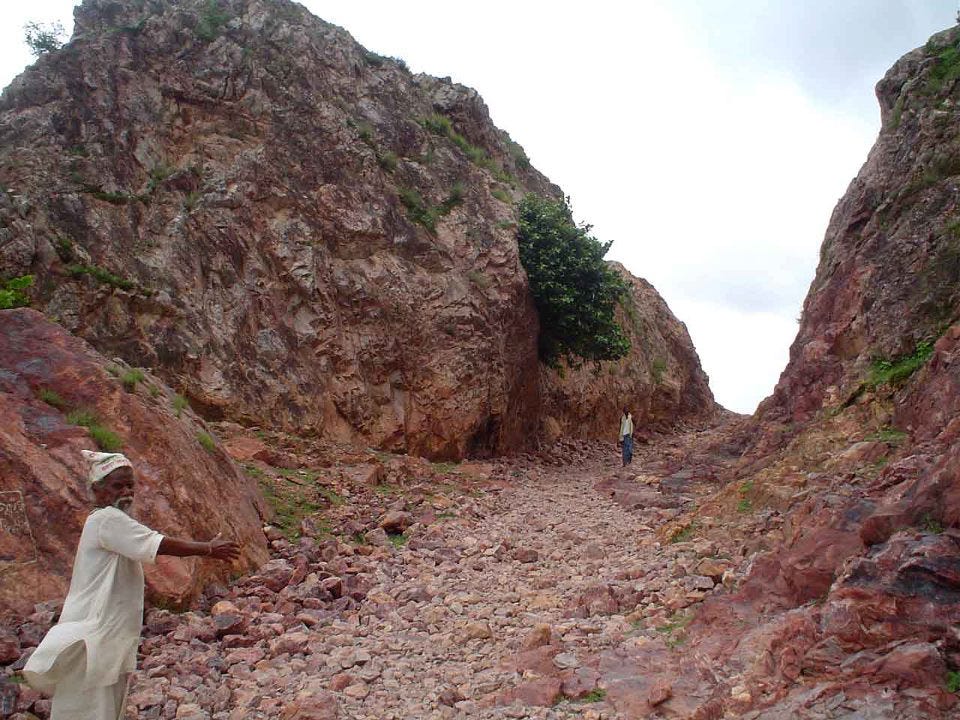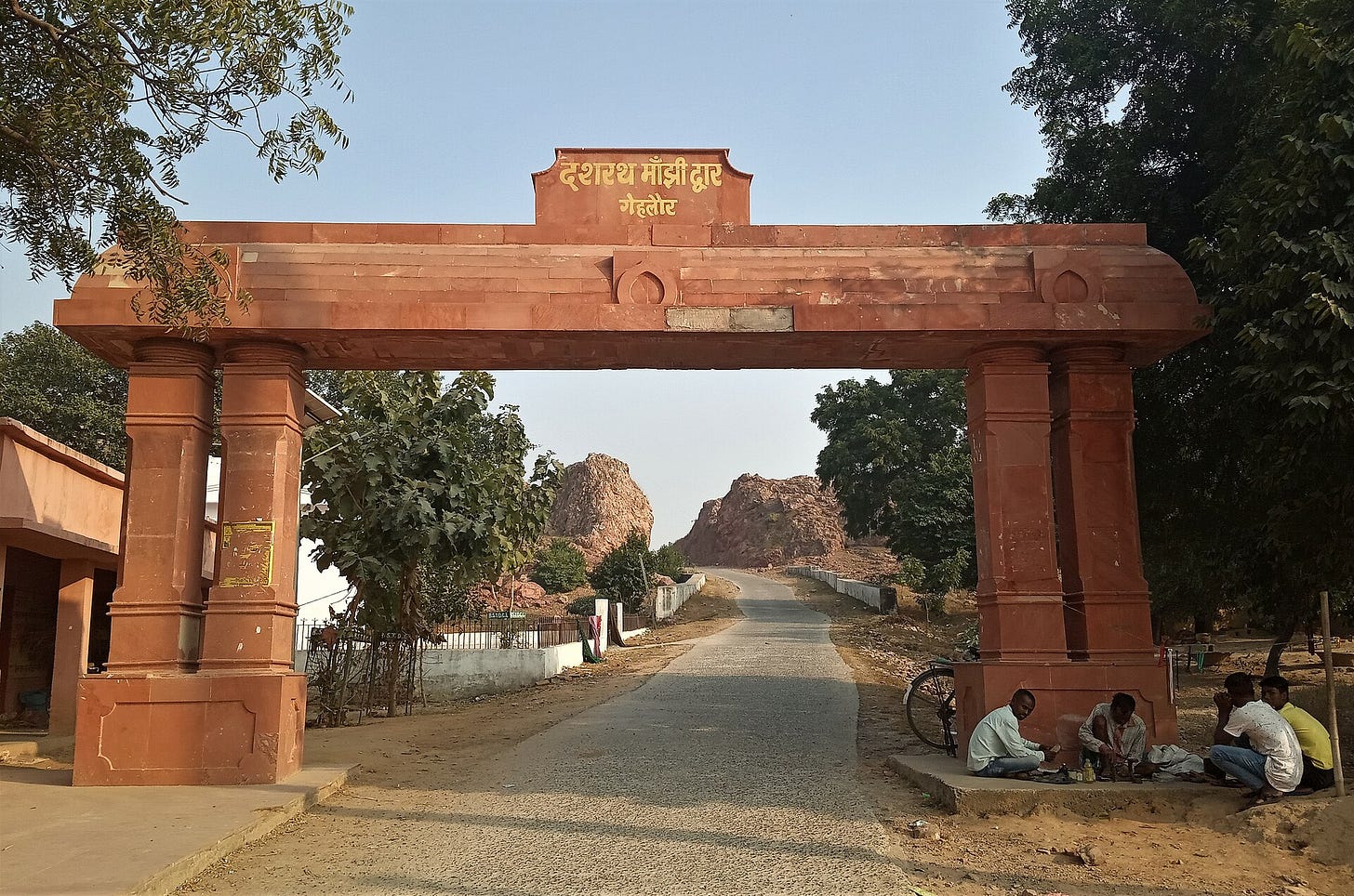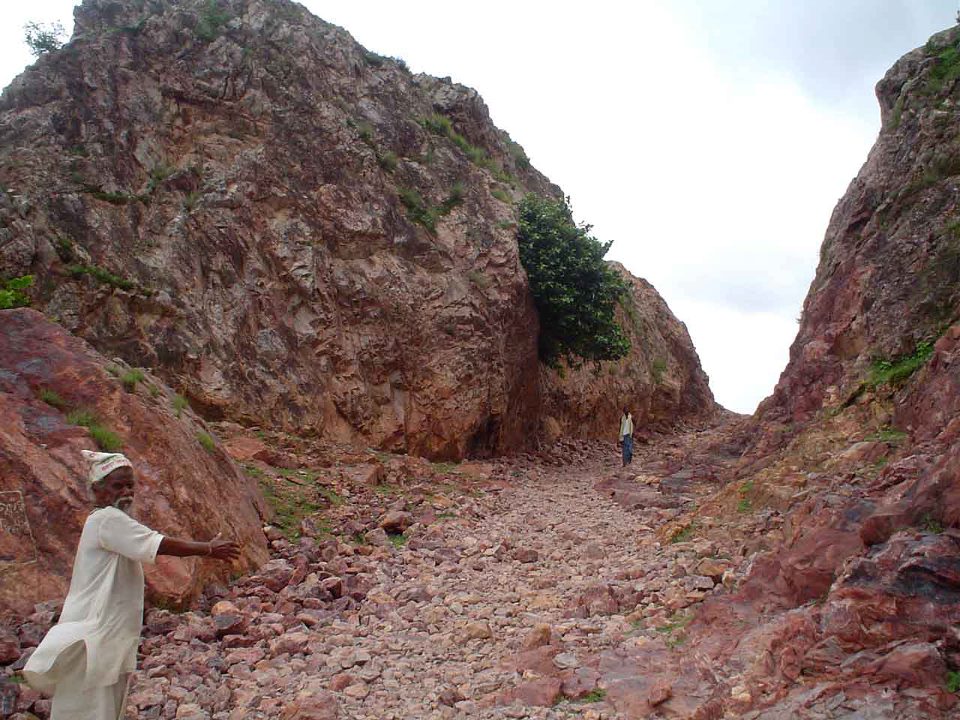If you’re having one of those days where things feel insurmountable and overwhelming… pull up a chair, friend. I have just the story for you.
It’s about an ordinary man named Dashrath Manjhi who lived in the shadow of a mountain.
That mountain made life hard for his people – the Musahar, landless laborers and members of the lowest caste in their hierarchical society. Trips over the mountain took hours over treacherous terrain, and laborers like himself had to take that trip daily for work on the other side.
Cutting a road through the mountain would mean easier access to jobs, healthcare, and education for people in 60 villages. But appeals to the government to create a road had fallen on deaf ears.
Nothing would change. Or so it seemed.
Until one day, when while crossing the mountain to bring him lunch, Dashrath’s wife fell and injured her leg. As he watched her limp toward him, he decided he had had enough.
As he said shortly before his death in 2007: “This hill had given us trouble and grief for centuries. The people had asked the government many times to make a proper road through the hill, but nobody paid any attention. So I just decided I would do it all by myself.”
And so, armed with a simple chisel, a hammer, and a shovel, Dashrath began – single-handedly – to cut a path through solid rock.
Every day after finishing his work as a farm laborer he would head to the mountain, to literally chip away at this barrier that separated him and his people from a better life.
Friends made fun of him.
People called him crazy.
But day after day, week after week, year after year, decade after decade he continued, barely sleeping, finally leaving his laborer job to conquer the mountain full-time. He was a man possessed.
And twenty-two years after heaving the first shovelful, Dashrath Manjhi broke that mountain.

When all was said and done, he had carved a path 360 feet long and 30 feet wide, using his bare hands, simple tools, and an extraordinary heart.
And in doing so he created a road that meant freedom, giving people from 60 villages access to markets, healthcare, and jobs that now were just five kilometers away. Children who used to walk eight kilometers to school could now get there in three.
Now with easier access to healthcare, some lives were literally saved. Other lives were made simpler, better, safer.
All because of one man, and his unwavering belief that with enough time and effort, he could help make life better for everyone.
I think of this story often. Maybe because it’s an inspiring lesson in persistence, courageous hope, and sheer stubbornness.
Or maybe because working with Democrats running in some of the reddest, most gerrymandered districts – in some of the reddest states in the country – feels like standing in front of a 300-foot mountain, armed with nothing more than a hammer and chisel.
Or maybe it’s because there’s something that’s always haunted me about his story. Dashrath was a remarkable person – who was eventually honored with a state burial, and with a postage stamp bearing his image.

The Dashrath Manjhi Entry Gate.
But over the 22 years that he cut down that mountain, he mostly worked by himself.
There were 60 villages that benefited from the road that he cut. Scores of people had to cross that mountain every day to get to and from work and school. Able, but unwilling, bodies passed him at his work daily.
So while this story inspires me because of what one man did, it also breaks my heart because of what could have been. What would have happened if everyone else in the village had pitched in after that first year? Rather than having a road in 22 years, perhaps they would have had a road in 10. Or 5. Or even less.
Imagine what a difference could have been made in those years. And – for Dashrath personally, as a man who devoted nearly every waking moment to bringing this road to other people – imagine how much of his own life he could have gotten back?
Friend, fighting for Democrats who are running in the reddest districts in the country often feels like standing on one side of a mountain. And for a few years now, we’ve been breaking rocks and hauling dirt, forging the beginnings of what will eventually become a well-worn path.
I’ll be honest that when Every State Blue started out supporting underdogs for red-state state legislatures, it was pretty lonely work. There weren’t many who saw the vision, who understood that cutting this road would lead to something better for so many people. Plenty of folks thought we should spend our time and resources in other places.
We just kept splitting rocks.
Then slowly, and now suddenly (almost miraculously) we have company. Now there are other organizations and activists that are calling attention to the need to fight in every race, in every district, in every state – no matter how red or gerrymandered it is. They’re citing our study (or their own) for the benefits of having down-ballot candidates on the ticket. They’re explaining why running everywhere means progress everywhere. They’re recruiting, and training, and volunteering, and postcarding, and …
It’s … magical.
Friend, together, we can do so much.
We are still standing in front of a mountain. But now, we’re not standing alone. Now there are other people, like you, on our left and right, setting cracks in the rock, shoveling stone, and pushing boulders out of the way.
We can already see the crack in the mountain. We’re not that far from the other side.
Pick up your chisel.
Go grab your shovel.
And let’s get to work.
Small Deeds to Do for May 21, 2024
Here’s the part where – if you are so inclined – we roll up our sleeves and engage in what I like to call Action Therapy. Each Tuesday I share a Small Thing to Read, a Small Event to Attend, and a Small Call to Make or Action to Take. You can tuck these actions into your week with ease – and know that you’re doing something today to make tomorrow better.
And hey – if you’re into splitting rocks … err, I mean supporting down-ballot Democratic nominees in red states, check out Every State Blue. We are the umbrella organization for Blue Missouri, Blue Ohio, Blue Tennessee, and Blue Texas. Join one of our state projects, or chip in here.
A Small Thing(s) to Read:
First, no doubt you’ve heard that an upside-down flag (the universal sign of distress, and a common symbol of the “stop the steal” movement) was flown at Justice Alito’s house in January 2021. Since the story broke last week, there’s been renewed attention on the Court and the clear bias of both Justices Alito and Thomas. This excellent op-ed was shared by Jess Craven of Chop Wood Carry Water this afternoon. It’s an excellent piece that will hopefully galvanize people into demanding more accountability. (As a gift link you can read it even if you are not a subscriber to the NYT.) Then hop down to the Small Call to Make for follow up on this.
Second, have you been wondering about the possible outcomes of the Trump trial in Manhattan? There’s a ton of legal analysis out there – a lot of it is pretty weedy. So I wanted to share this really simple, blissfully short, piece that describes in clear terms what could happen as the jury goes into deliberations. https://www.brennancenter.org/our-work/research-reports/how-could-trumps-new-york-hush-money-trial-end
Small Thing to Attend:
Tomorrow, Wednesday May 22 at noon eastern, join Big Tent, Dr. Carol Anderson (award-winning author and the Robert W. Woodruff Professor of African American Studies at Emory University) and Lauren Groh-Wargo (CEO of Fair Fight) to break down how Georgia has led the way at making it harder for certain Georgians to vote.
Register HERE.
Just after Big Tent’s event, at 1pm eastern, join Mike Lux, political consultant and founder of American Family Voices, and Anthony Flaccavento, co-founder of Rural Urban Bridge Initiative, for their webinar Winning Short-term and Long-term: Preserving Democracy, Rebuilding Rural Economies, and Winning Back Rural Voters. They’ll focus on how to win back rural voters. (May 22 at 1pm eastern.)
Register here.
Small Call to Make:
The Supreme Court has an ethics problem, and it’s one Congress needs to help solve. So this week, call your Senators and ask them to support the Supreme Court Ethics, Recusal, and Transparency Act (S. 359). It’s a simple script:
Hi, my name is [name] and I’m calling from [zip]. I’m calling to ask the Senator to support the Supreme Court Ethics, Recusal, and Transparency Act. The Supreme Court has an ethics problem, and it’s become obvious to everyday Americans that it can’t fix it on its own. Even the appearance of bias is enough to erode confidence in the Court. Please work to pass this bill.
Thanks for reading, friend – I’m glad to see you here! If you love what I do and you want to support it, consider becoming a paid subscriber on Substack. It means a lot!
